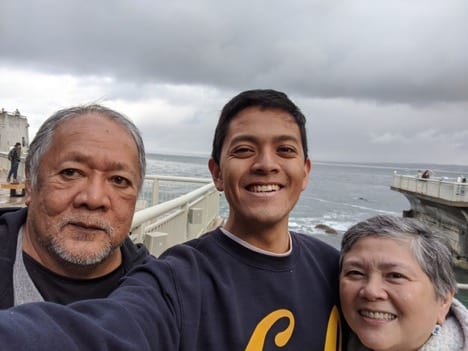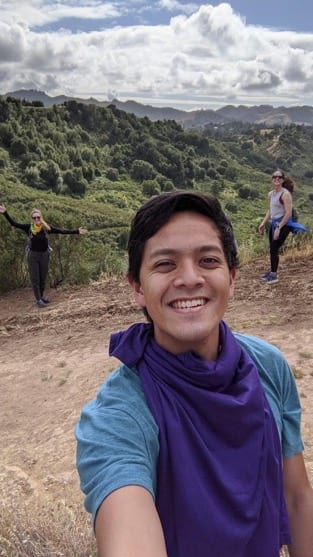In honor of Asian Pacific American Heritage Month, we’re featuring profiles and interviews with members of our Haas community.

Augustine Santillan, MBA/MEng 21, lived in the Midwest for most of his life. Though he identified as Filipino American growing up, Santillan hadn’t fully explored all of the richness and nuances of his Filipino heritage until he was an undergraduate at Northwestern. At Haas, he hopes to initiate more conversations about diversity and inclusion and encourage more Asian American students to enroll at Haas.
Tell me about your background and where you grew up?
I’m Filipino-American. I was born in Guam, but my parents are from Metro Manila, the capital of the Philippines. My family and I moved to the U.S. when I was two months old. My mom is a neurologist and my father is an IT specialist and so we moved wherever the jobs were. I like to say that I’m from the Midwest because I lived in Cleveland, Green Bay, and later the suburbs of Chicago when I was a college student. As I was growing up in the Midwest, though, I did have some trouble defining myself and my heritage. There weren’t a lot of people who looked like me and so I had to go on this journey of defining my own cultural identity on my own.
So how did you go about defining your cultural identity?
I think it was difficult for me to relate to my culture because I really didn’t feel like I could own it. I didn’t feel authentic at all, especially since I didn’t speak Tagalog. But that changed when I went to college. When I was a student at Northwestern, I joined a Filipino student group that was open to everyone, not just Filipinos and Filipino Americans. As a group, we reflected and talked about our identities, participated in race-focused workshops, performed traditional dances, and wrote skits about our cultural experiences. All of these experiences have helped me define my relationship to my culture, given me more of a nuanced appreciation for my cultural context, and an even stronger sense of pride and gratitude for my family.
Growing up, what were some of the ways you connected and explored your heritage?
I explored and celebrated my heritage through food and family gatherings. We’d cook some of our favorite dishes like pork Nilaga, a stew made with pork neckbones, and chicken adobo, chicken cooked in soy sauce, vinegar, and garlic. My family and I would also go on road trips to visit our extended family in Chicago, especially during the holidays. Karaoke is also a huge part of my heritage. My family and I love to sing. I’ll always remember hearing my parents and their friends sing songs from the Beatles and ABBA in the basement of my uncle’s house. I’m personally a big fan of Marvin Gaye and Tammi Terrell’s song “Ain’t No Mountain High Enough.” It’s a great duet for karaoke.

Why did you decide to go to business school and did your heritage play a role in your decision?
I think my upbringing and my love for travel were factors that led me to take on consulting, especially for airlines and hotels. I learned early on that change is the only constant and that there’s always going to be new challenges to tackle. So going to business school and looking at new career paths that address global issues through social impact work is another challenge for me–one that excites me. Soon, I’ll be working at Tesla where I’ll have the chance to combine my passion for transportation with sustainability and clean energy. I’ll be working on strategy for their charging infrastructure, which I’m excited about.
Another reason I wanted to go to business school was because I was excited about creating more representation. Sometimes I feel like people don’t think that they belong in these spaces [business school]. Oftentimes, you hear about Asian Americans being overrepresented on college campuses, especially at Berkeley, and that we don’t need to invest as much energy in recruiting them to come to business school. There’s so much richness and color under this bucket of Asian Americans and I’ve been pushing the community at Haas to think about that diversity. It’s not just Chinese and Korean Americans that are part of the community at Haas, but also Pakistani Americans and Filipino Americans, to name a couple. That being said, I want to be here to pave the path for other Asian Americans and show them that they belong here and that they can be successful.